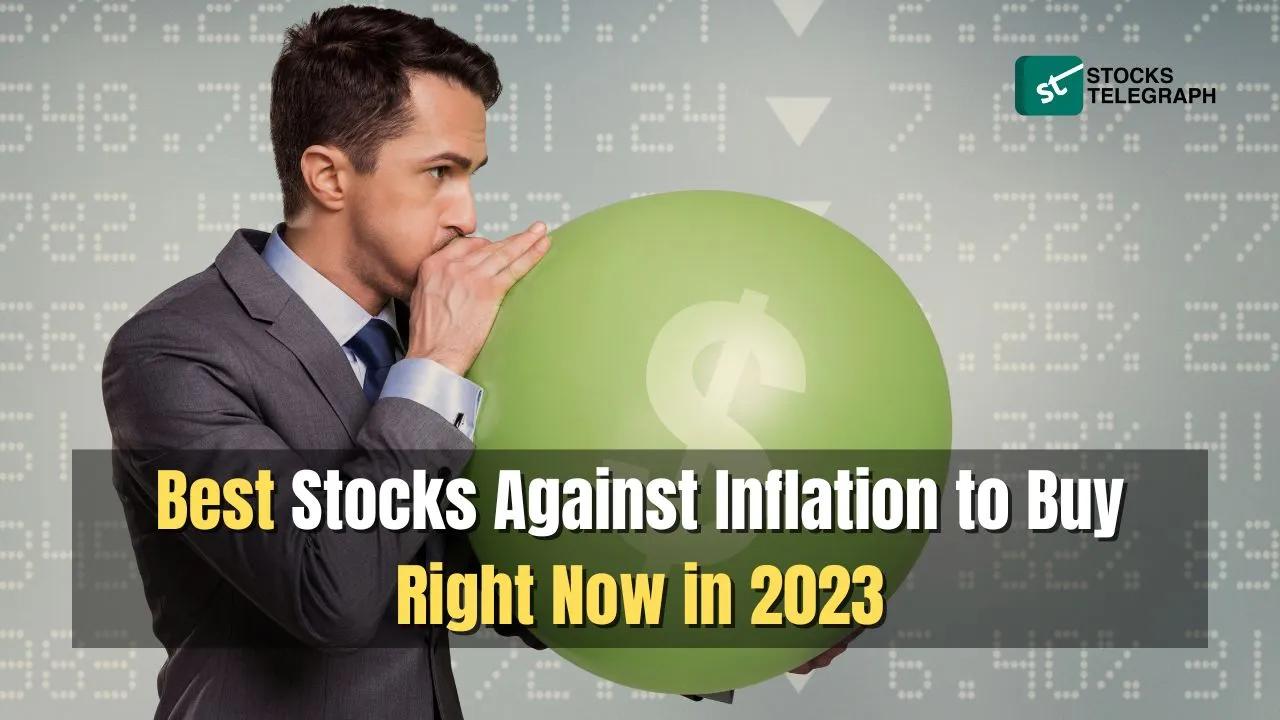The present conditions have brought on inflation levels that have surpassed the record of prior decades. The global economic system faces several pressures.
These include a post-pandemic demand surge, coupled with supply chain complications, owing to the Russian invasion of Ukraine.
Moreover, the hiking of interest rates by the US to combat inflation continues to make borrowing more costly, which thus makes business expansion and stocks in inflation far more challenging.
Given the severity of these inflationary pressures, investors are rightfully turning to stocks as a hedge against these circumstances.
Generally, investing in stocks is a go-to approach for many that seek to inflation-proof their funds.
Just as the price of commodities sees a general upward rise, so too does that of shares in public companies.
This is especially true for value stocks, as opposed to growth stocks. In this article, we present the top 5 stocks you could invest in to inflation-proof your stock portfolio.
Historic Industry and Stock Performance
Inflation has always been a concern for investors, eroding the purchasing power of their investments over time.
However, some industries and stocks have historically performed better during periods of inflation.
These sectors have demonstrated the ability to generate strong returns and preserve value for investors.
Understanding the historical performance of different industries and stocks can help identify the best stocks against inflation.
-
Consumer Staples
Consumer staple companies are known for producing essential goods and services that people need regardless of economic conditions.
These companies tend to maintain stable demand for their products and show resilience during such periods, making their stocks own during inflation.
Industries such as food and beverage, household products, and healthcare have shown consistent performance in the face of rising prices.
-
Energy And Commodities
Energy and commodities are often considered hedges against inflation.
As prices rise, companies involved in oil, natural gas, and other commodities can benefit from increased revenues.
Additionally, commodity-based companies can pass on higher production costs to consumers and maintain profitability, making them suitable stocks to own during inflation.
-
Real Estate
Real estate has proven to be a good inflation hedge over time. Property values and rental incomes tend to rise with inflation, protecting investors’ purchasing power.
Real estate investment trusts (REITs) provide a way for individuals to invest in the real estate sector without directly owning properties.
-
Infrastructure
Investing in infrastructure-related stocks to own during inflation can be a smart choice during those unstable periods.
Governments often increase spending on infrastructure projects to stimulate the economy, which can benefit companies involved in construction, engineering, and materials.
These sectors tend to experience increased demand and improved profitability during inflationary times.
What Are the Best and Worst Stocks to Combat Inflation?
As investors grapple with the challenges posed by inflation, it becomes crucial to identify stocks that can provide a hedge against its erosive effects.
While there is no one-size-fits-all solution, certain sectors and stocks have historically shown resilience in combating inflation.
This article explores the best and worst stocks to consider during inflationary periods.
-
Best Stocks to Combat Inflation
-
Consumer Staples
Companies that produce essential goods like food, beverages, and personal care items tend to fare well during inflation.
These companies have established brands and pricing power, enabling them to pass on increased costs to consumers.

-
Energy
Energy companies, particularly those involved in oil and natural gas production, can benefit from rising energy prices during inflationary periods.
These firms generate revenue from increased demand and higher prices for their products.
-
Real Estate
Real estate investment trusts (REITs) are often considered a good inflation hedge.
REITs own and operate income-generating properties, such as residential, commercial, and industrial real estate.
These investments can provide a stable income stream and potential appreciation over time.
-
-
Worst Stocks to Combat Inflation
-
Technology
While the technology sector offers substantial growth potential, it may face challenges during inflationary periods.
Tech companies often operate in highly competitive markets with thinner profit margins. Additionally, rising interest rates can impact the valuation of high-growth stocks in this sector.
-
Fixed-Income Securities
Bonds and other fixed-income investments typically underperform during inflationary periods.
As inflation erodes the purchasing power of fixed-interest payments, the real returns on these investments decrease.
Investors seeking to combat inflation should be cautious with long-term bonds or low-yielding fixed-income securities.
-
Luxury Goods
Companies that specialize in luxury goods and services may struggle during inflationary periods.
As consumer spending habits shift towards essential items, demand for luxury products tends to decrease.
These companies often face pricing pressure and reduced profitability in such economic conditions.
-
How Does Inflation Affect Stocks?
Inflation has significant implications for various sectors of the economy. One area where its impact is keenly observed is the stock market.
Inflation can exert both direct and indirect effects on stock prices, influencing investor sentiment, corporate profitability, and overall market dynamics.
-
Investor Sentiment and Risk Perception
Inflation can shape investor sentiment and risk perception, affecting stock prices.
As inflation erodes the purchasing power of money, investors may seek alternative investments to protect their wealth.
Consequently, the demand for stocks may decrease, leading to a decline in stock prices.
-
Corporate Profitability
Inflation can impact corporate profitability through various channels.
Rising input costs, such as raw materials, wages, and energy, can squeeze profit margins, affecting companies’ ability to generate earnings growth.
Businesses may find it challenging to pass on these increased costs to consumers, leading to lower profit margins and reduced stock prices.
-
Dividend And Earnings Expectations
Inflation can influence dividend and earnings expectations, which, in turn, affect stock prices.
Companies may struggle to maintain or increase dividends during periods of high inflation, as their ability to generate consistent cash flows may be hindered.
This can reduce the attractiveness of dividend-paying stocks, leading to lower demand and potential price declines.
-
Monetary Policy and Interest Rates
The response of central banks to inflation can significantly impact stock markets. To curb inflation, central banks may implement tighter monetary policies, raising interest rates.
Higher interest rates can make fixed-income investments, such as bonds, more attractive relative to stocks.
Best Stocks Against Inflation
Investors seeking protection against inflation should consider stocks that align with sectors that traditionally perform well during periods of rising prices.
Industries like energy, commodities, infrastructure, and healthcare tend to provide stability.
Additionally, focusing on companies with strong fundamentals, consistent revenue growth, and a history of dividend payments can enhance long-term returns.
We have gathered here 5 of the best stocks against inflation.
-
Apple Inc.
As first of the best stocks against inflation we present is that of the undisputed tech king, Apple Inc. (NASDAQ: AAPL). Apple is one of the few stocks that need no introduction.
The company is valued at over $2.99 trillion, in terms of market capitalization, making it one of the most valuable in the world.
Apple is typically the first inflation-proof stock to come to mind for many seasoned investors, given the various attributes it holds, which makes it ideal for this purpose.
For one, unlike most companies, Apple has both an affluent and highly loyal customer base, which gives it substantial pricing power.
For this purpose, passing on inflated costs to consumers is unlikely to impact its overall demand.
Secondly, the company benefits from fixed-cost, long-term supply contracts, as a result of which its exposure to inflation remains limited, to a large degree.
The third aspect to consider here is Apple’s robust balance sheet, which reports almost $166 billion in cash and investments.
Given the interest rate hike in response to such inflation, Apple’s interest returns have been seeing a boost, which is likely to offset the costs of inflation, keeping its business largely sustainable.
Apple is an extremely safe investment choice, and optimal to buy and hold for a period of inflation.
-
Waste Management Inc.
The second among best stocks against inflation is the American giant, Waste Management Inc. (NYSE: WM).
Valued at over $65 billion, Waste Management represents a stable and sizeable operation that caters to both the United States and Canada.
WM provides waste management and recycling services to millions of residential customers, as well as to municipal, industrial, and commercial clients.

The most apparent advantage that WM offers is its large capitalization, which makes it far more likely to remain immune to macroeconomic volatilities.
Moreover, given the nature of its business, WM is far from being a trendy stock that grows in and out of public interest.
The company offers services that remain at a constant level of demand, despite external circumstances.
Where technological breakthroughs offer the promise of explosive growth, they also come with a fair share of risk.
WM on the other hand sticks to what it does best, in the most operationally efficient manner it knows.
This gives the company a predictable income stream, which makes it a safe stock in these uncertain times.
The company also pays out a nice dividend, with a yield of 1.66%.
Its management commits to steadily increasing this over the years, as a result of which its 5-year annualized dividend growth rate stands at almost 7.23%.
From an inflation standpoint, this is quite advantageous to hold, as opposed to non-dividend paying stocks.
The primary reason is these periodic payments offset the loss in purchasing power that typically comes as a consequence of inflation.
WM is a safe and reliable stock you can count on to hedge your portfolio in these inflationary conditions.
-
Newmont Corporation
Next up on our list of best stocks against inflation is the gold producer and explorer, Newmont Corporation (NYSE: NEM).
Gold in general is seen by many as a safe haven stock during economic tough times, especially when these times involve inflation.
In this context, gold is the go-to choice for investors, given the stability in its market price, owing to its rarity.
Newmont Corporation is the ideal pick for those that have decided to hedge their portfolios against inflation through gold.
Newmont is the global world leader in the gold industry, and with a market capitalization of $36 billion, stands as the largest player against all its peers.
The company’s financial performance is another crucial factor here. Newmont is one of the few that has consistently seen its revenue rise since 2018, even during the pandemic in 2020.
In 2022, its annual revenue was reported at $11.92 billion, in comparison to the prior year’s figure of $12.22 billion.
Furthermore, the company is one that is extremely resilient to recessions, given its recent financial performance.
Other commodity prices typically fall during recessions, yet gold maintains its stability through these conditions.
It also points to why the stock is great for consideration in the present economic climate.
-
Federal Realty Investment Trust
The fourth in our list of best stocks against inflation, we bring to you is the REIT, Federal Realty Investment Trust (NYSE: FRT). FRT is a great inflation time stock for two core reasons.
The first is that being a REIT, it is unlikely to be impacted by conditions of rising costs.
With its longstanding history since 1962, and its stream of income diversified across vast areas of the real estate realm, the REIT is one of the best worth considering.
In fact, FRT is well known for going against the tides even in the most severe economic crises of the last half-century.
What better stock to opt for that has a proven track record of faring well in tough times?
In addition to its historical performance, owing to the nature of its business, another strength of FRT is its status as an absolute dividend king.

The company has been increasing its annual dividend payment to its shareholders for the last 55 years without fail. With its yield at over 4%, this is spectacular to consider.
Not only would FRT be a great store of value in times of inflation, but it would also be enhancing one’s liquidity and income through periodic payments. FRT truly offers the best of both worlds.
-
Epam Systems Inc.
The final among best stocks against inflation on our list is the renowned software champion, Epam Systems Inc., (NYSE: EPAM).
The company provides specialized software packages to client companies across the world and is at the forefront of high-value outsourcing.
Ever since the Covid-19 pandemic triggered a global transition towards digitization, EPAM has been performing exceptionally, on the financial front.
Despite the shutdowns, companies remain committed to focusing on enhancing their digital presence.
The critical nature of the company’s services also plays a significant role in ensuring its performance during inflation as well as in recession.
Furthermore, it is impressive that the positive momentum in EPAM’s performance appears far from slowing down.
In the first quarter of 2023, EPAM reported a revenue figure of almost $1.21 billion, which came with a $39.3 million increase year-on-year.
It had achieved such striking success despite its significant exposure to the Ukraine-Russia military conflict.
In fact, when the conflict had broken out, EPAM saw a price plummet, as investors feared the worse. Despite these concerns, the company’s performance has only increased its gears.
Where the analyst consensus for quarterly EPS was set at $2.34, EPAM had gone on to report a figure of an impressive $2.47.
EPAM is a winner in every sense. For those looking to safely ride through this wave of inflation, the best bet is to stick to winners such as EPAM.
Here, we have also listed down 20 of the best stocks against inflation:
| No. | Ticker | Company | Industry | Market Cap (in millions) | EPS Growth (past 5 yrs) | EPS Growth (next 5 years) | Sales Growth (past 5 years) |
| 1 | BMRN | BioMarin Pharmaceutical Inc. | Healthcare | 16,087.75 | 30.20% | 58.00% | 9.80% |
| 2 | LLY | Eli Lilly and Company | Drug Manufacturers – General | 412,649.22 | 10.10% | 24.63% | 7.40% |
| 3 | AZN | AstraZeneca PLC | Drug Manufacturers – General | 207,909.07 | 2.30% | 13.10% | 14.60% |
| 4 | ORLY | O’Reilly Automotive, Inc. | Specialty Retail | 58,203.76 | 22.60% | 11.20% | 9.90% |
| 5 | AMT | American Tower Corporation | REIT – Specialty | 91,736.17 | 7.40% | 10.29% | 10.00% |
| 6 | ROST | Ross Stores, Inc. | Apparel Retail | 37,976.25 | 5.60% | 10.10% | 5.80% |
| 7 | AMD | Advanced Micro Devices, Inc. | Semiconductors | 186,672.68 | 21.90% | 9.87% | 35.10% |
| 8 | BDX | Becton, Dickinson, and Company | Medical Instruments & Supplies | 73,830.18 | 3.10% | 9.85% | 9.30% |
| 9 | MDLZ | Mondelez International, Inc. | Confectioners | 97,821.58 | 1.50% | 8.58% | 4.00% |
| 10 | PEP | PepsiCo, Inc. | Beverages – Non-Alcoholic | 258,359.64 | 4.90% | 8.54% | 6.30% |
| 11 | KR | The Kroger Co. | Grocery Stores | 33,734.02 | 23.40% | 8.00% | 3.90% |
| 12 | MRK | Merck & Co., Inc. | Drug Manufacturers – General | 269,779.76 | 25.60% | 7.91% | 8.10% |
| 13 | CMS | CMS Energy Corporation | Utilities – Regulated Electric | 17,741.33 | 3.80% | 7.80% | 5.50% |
| 14 | LOW | Lowe’s Companies, Inc. | Home Improvement Retail | 134,505.99 | 19.80% | 6.35% | 7.20% |
| 15 | XEL | Xcel Energy Inc. | Utilities – Regulated Electric | 35,404.41 | 6.60% | 6.10% | 6.10% |
| 16 | AEE | Ameren Corporation | Utilities – Regulated Electric | 22,387.16 | 8.30% | 5.90% | 5.20% |
| 17 | HRL | Hormel Foods Corporation | Packaged Foods | 21,719.56 | 3.00% | 3.50% | 6.30% |
| 18 | BALL | Ball Corporation | Packaging & Containers | 17,727.64 | 11.90% | 3.10% | 6.90% |
| 19 | HD | The Home Depot, Inc. | Home Improvement Retail | 316,291.11 | 17.70% | 1.85% | 9.30% |
| 20 | NVR | NVR, Inc. | Residential Construction | 20,532.92 | 28.30% | -2.90% | 10.80% |
Methodology
Investing in stocks that can withstand the impact of inflation requires a robust methodology that considers various factors.
For those planning to start the process of where to buy inflation stocks, here is a comprehensive approach to selecting the best stocks against inflation:
-
Defensive Sectors
Start by focusing on defensive sectors that have historically performed well during inflationary periods. These sectors include utilities, consumer staples, healthcare, and infrastructure.
These industries tend to be less affected by inflation as their products and services remain in demand regardless of economic conditions.
-
Strong Price Performance
For a better understanding of where to buy inflation stocks, analyze the historical price performance of stocks during inflationary periods.
Look for companies that have consistently outperformed their peers and the broader market during times of rising inflation.
This demonstrates their ability to maintain value and potentially deliver higher returns.
-
Smaller-Than-Average Drawdowns
Assess the stocks’ historical drawdowns during inflationary periods.
Companies that have experienced smaller drawdowns compared to their industry peers indicate better resilience and stability.
Look for stocks that have demonstrated the ability to limit losses during inflationary periods.
-
Dividend Yield
Consider stocks with a solid dividend yield. Dividends can provide a consistent income stream and act as a hedge against inflation.
Look for companies that have a track record of increasing or maintaining their dividends even in inflationary environments.
-
Strong Financial Health
Evaluating the financial health of the companies could also help investors to understand the phenomenon of where to buy inflation stocks.
Look for stocks with strong balance sheets, low debt levels, and healthy cash flow generation. Companies with strong financial health are better positioned to weather inflationary pressures.
-
Increasing Sales And EPS
Analyze the companies’ sales growth and earnings per share (EPS) performance.
Look for stocks that have consistently shown growth in sales and EPS, indicating their ability to generate higher revenue and profitability despite inflationary pressures.
-
Minimum Stock Requirements
Establish minimum requirements for stocks to meet before considering them as potential investments.
These requirements could include factors such as minimum market capitalization, liquidity, and a proven track record of delivering shareholder value.
By combining these factors, investors can develop a methodology for choosing the best stocks that have the potential to perform well against inflation.

It’s important to remember that investing always carries risks, and diversification across multiple sectors and asset classes is crucial for mitigating these risks.
What Are the Advantages and Disadvantages of Investing in Stocks During Inflation?
| Advantages | Disadvantages |
| Potential For Higher Returns:
Stocks have historically outperformed other asset classes over the long term, providing the opportunity for significant capital appreciation during inflationary periods. Companies that can successfully navigate inflation may increase their revenues and profitability, leading to higher stock prices and potential gains for investors. |
Market Volatility:
Stock markets can experience increased volatility during inflationary periods, leading to sudden price fluctuations and potential losses. Investors may need to tolerate short-term market volatility and be prepared for potential downturns. |
| Diversification:
Investing in stocks allows for diversification across different industries and sectors, which can help mitigate the impact of inflation on a portfolio. Companies in certain sectors, such as energy, commodities, or technology, may perform well during inflation, offsetting potential losses in other sectors. |
Interest Rate Impact:
During inflation, central banks often respond by increasing interest rates to curb rising prices. Higher interest rates can make borrowing more expensive for companies, potentially impacting their profitability and, consequently, stock prices. |
| Dividend Income:
Some stocks offer regular dividend payments, which can provide a steady income stream during inflation. Dividends can help investors maintain purchasing power and potentially outpace inflationary pressures. |
Company-Specific Risks:
Investing in individual stocks carries inherent risks related to the performance of the specific company. Inflation can expose certain companies to higher costs, supply chain disruptions, or decreased consumer spending, which may negatively impact their stock prices. |
| Hedge Against Inflation:
Stocks can serve as a hedge against inflation as the value of a company’s assets, earnings, and stock prices may increase with rising prices. Inflation can erode the purchasing power of cash, making stocks a potential way to preserve and grow wealth over time. |
Inflationary Expectations:
Stock prices may already reflect market expectations of inflation, potentially limiting the upside potential. If investors have already bid up the prices of stocks in anticipation of inflation, there might be limited room for additional gains. |
Combat Inflation by Investing in The Best Assets
Inflation can erode the value of your money over time, making it essential to find ways to combat its effects.
One effective strategy is to invest in the best assets that have historically provided a hedge against inflation.
By diversifying your investment portfolio with these assets, you can potentially protect your purchasing power and preserve wealth in the face of rising prices.
-
Real Estate
Investing in real estate is an excellent way to combat inflation. Properties tend to appreciate in value over time, keeping pace with or even outpacing inflation rates.
Additionally, rental income can provide a steady cash flow, which can further offset the impact of inflation.
-
Commodities
Commodities like gold, silver, oil, and agricultural products have long been considered inflation-resistant assets.
They often serve as safe havens during economic uncertainty and inflationary periods, as their prices tend to rise when the value of fiat currencies declines.
-
Stocks
Investing in stocks can also be an effective strategy against inflation.
Companies that have pricing power, strong fundamentals, and sustainable competitive advantages are more likely to weather inflationary pressures.
These stocks can potentially provide higher returns than the rate of inflation, preserving and growing your purchasing power.
-
Treasury Inflation-Protected Securities (TIPS)
TIPS are government-issued bonds specifically designed to protect against inflation.
The principal value of TIPS is adjusted based on changes in the Consumer Price Index (CPI), ensuring that investors receive a return that keeps pace with inflation.
These securities provide a reliable way to combat inflation while offering a fixed income.
-
Diversification
Diversifying your investments across various asset classes is crucial to combat inflation. By spreading your investments, you reduce the risk of being overly exposed to a single asset class.
A diversified portfolio allows you to take advantage of different assets’ performance characteristics, ensuring that your investments are not entirely vulnerable to inflation.
Conclusion
For those looking to cash in on a regular income that is both steadily growing and sustainable, there is no better place to start than a stellar, dividend-paying portfolio.
The best stocks of this class are those that, through growth investors maintain their purchasing power throughout the pressures of inflation.
It also ensures modest growth of their capital while they enjoy their dividend income.
Each of the stocks for inflation mentioned in this article strikes this core balance and hence is a must-buy for 2024.
FAQs
How To Beat Inflation In 2023?
To beat inflation in 2023, diversify your investments across different asset classes, such as stocks, bonds, real estate, and commodities.
Consider investing in inflation-protected securities and assets with long-term growth potential. Focus on increasing your income through side hustles or acquiring new skills.
Prioritize saving and creating an emergency fund to mitigate financial shocks. Stay informed about economic trends and adjust your financial strategies accordingly.
Are Dividend Stocks Good During Inflation?
Dividend stocks can offer a potential hedge against inflation, as they provide consistent income streams that may help offset rising prices.
While inflation erodes the purchasing power of money, dividends often increase over time, keeping pace or even outpacing inflation.
However, it’s crucial to consider factors such as the company’s stability, dividend history, and performance to determine the long-term viability of dividend stocks during inflation.
How Bad Will Inflation Be In 2025?
Predicting the precise severity of inflation in 2025 is challenging due to numerous factors at play.
Economists and analysts foresee a moderate rise, but its ultimate extent remains uncertain.
Supply chain disruptions, fiscal policies, and global economic dynamics will significantly influence the outcome.
Prudent policy decisions and proactive measures are imperative to mitigate potential inflationary pressures and ensure stability in the coming years.
